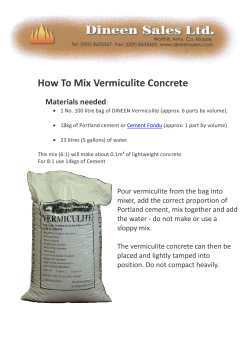
Document 151030
Saf et yBul l et i n Conc r e t eBur ns Ho wt op r o t e c ty o ur s e l fwh e nwo r k i n g wi t hf r e s h ,we tc o nc r e t References: Portland Cement Association (PCA) – Cement and Concrete Basics/Working Safely With Concrete Construction Forestry Mining Engineers Union (CFMEU) Safety Alert 2005 Concrete Burns When working around fresh, wet concrete there is always the potential for concrete to come into direct contact with your skin and eyes. Contact of the skin with fresh concrete, mortar, or grout can lead to severe burns and are a hidden danger to anyone who works with, or around these materials. Causes • Abrasive sand contained in fresh concrete is abrasive to bare skin • Basic and Portland cement is alkaline in nature, so wet, caustic concrete and other cement mixtures are strongly basic (pH of 12 to 13). Strong bases – like strong acids – are harmful, or caustic to skin • Drying Portland cement is hygroscopic – it absorbs water. In fact, Portland cement needs water to harden. It will draw water away from any material it contacts, including skin. • The lime in concrete can cause serious burns. • The combination of wetness, chemical corrosiveness and abrasiveness can result in Dermatitis. Effects • Burns or a minor rash may result caused by the lime in fresh concrete and prolonged contact can be quite severe including third degree burns. These types of burns cause progressive redness, swelling, and pain followed by green and black dead skin which cause permanent scarring 1 • Irritant or contact dermatitis can result from the combination of wetness, chemical corrosiveness and the abrasiveness of concrete. Allergic dermatitis can result when operators become sensitized to the chromium salts in cement or some other additives. Workers who don’t use PPE are exposed daily to even mildly irritating substances and are likely to develop serious skin problems such as irritant dermatitis • Eye damage from chemical burns can be very serious causing the alkaline to gradually damage the inside of your eyelids or your eyes. Exposure to a chemical that has alkali substances such as cement could cause these eye injuries Protect Yourself Safe work practices must always be employed to protect yourself and others from any hazards caused by working with wet concrete. • Always wear appropriate Personal Protective Equipment (PPE). Especially proper eye wear. Concrete being pumped, dumped or poured from the back of a concrete truck is subject to splattering. 2 • Wear waterproof gloves when handling or placing concrete. • Avoid getting wet concrete inside your gloves or boots. • Wear a long sleeve shirt and full length pants. • Wear rubber boots when standing in concrete. • Clothing worn to protect from fresh concrete should not be allowed to become saturated with the moisture from the concrete because saturated clothing can transmit alkaline or hygroscopic effects to the skin. ALWAYS WEAR PROTECTIVE CLOTHING AND EYEWEAR WHEN WORKING WITH FRESH, WET CONCRETE First Aid The first few minutes after contact with an alkaline substance are the most important in managing the burn, once the alkaline penetrates the skin it progressively kills tissue even though you think nothing is there. • If fresh concrete comes into contact with your skin immediately flush skin with cool, clean water – seek medical advice is irritation persists. • For deep burns or large affected skin areas, seek medical attention immediately. • A recent study published in the official journal of the American Society of Plastic Surgeons (ASPS) by Dr S. Milner released in April 2003 shows that common “Household Vinegar” can minimize Alkaline Burn Injuries. The area should initially be cleansed with clean water and then apply the vinegar which helps neutralize the substance 15 minutes faster than water alone. 3 • In all cases of eye contact with chemicals, flood with cool, clean water for at least 15 minutes. Hold the head under the tap or pour water into the eye using a clean container and keep the eye open as widely as possible during flooding. Do not use an eye cup or bandage the eye and do not apply ointment, oils or salves. Do not use vinegar in the eyes Warning Contact with wet (unhardened) concrete, mortar, cement, or cement mixtures can cause SKIN IRRITATION, SEVERE CHEMICAL BURNS (THIRD-DEGREE), or SERIOUS EYE DAMAGE. Frequent exposure may be associated with irritant and/or allergic contact dermatitis. Always wear the proper personal protection equipment when working with these materials. Seek immediate medical attention if you have persistent or severe discomfort. 4 Ame r i c a nConc r e t eP umpi ngAs s oc i a t i on 6 06E nt e r pr i s eDr i v e|L e wi sCe nt e r , OH4 3 0 3 5 P H:6 1 4 . 4 3 1 . 5 6 1 8|F AX:6 1 4 . 4 3 1 . 6 9 44 www. c onc r e t e pumpe r s . c om
© Copyright 2025





















